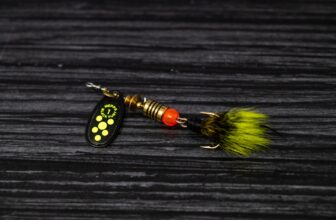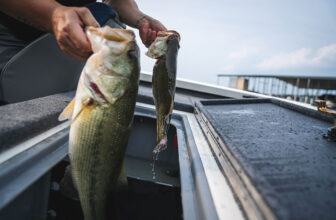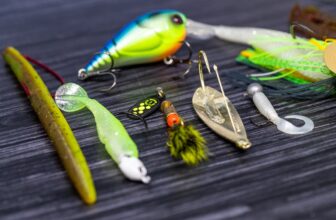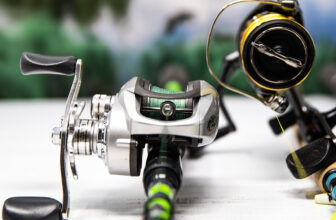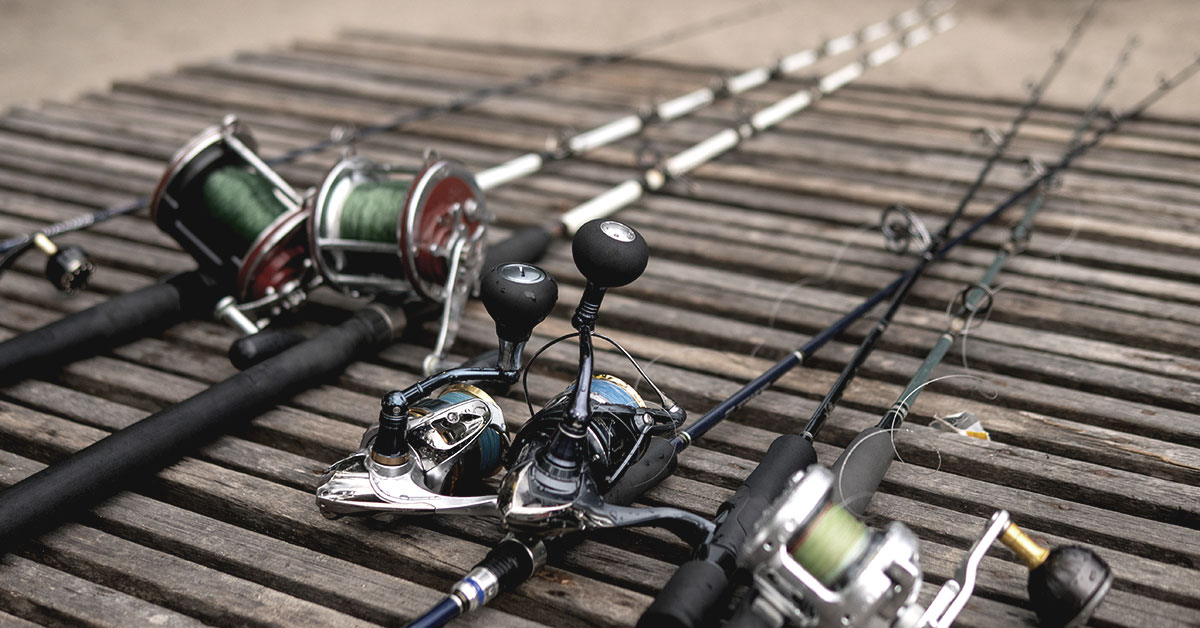
While there is no way to guarantee that you will land a Marlin or reach the bass you’re aiming for, the wrong fishing rod length can definitely make things more challenging than they should be. For an angler, the fishing rod is a trusty companion, and experts highly emphasize the importance of choosing one carefully.
To begin with, you need to be sure of which fishing rod length will suit you best. Then, you need to consider which material will prove to be highly durable and reliable for your days out on the water. With so much to consider, you can’t help but feel lost and overwhelmed.
In this article, we’ll share the most straightforward guide to help you choose the right fishing rod length.
The General Length Rule
The first factor one identifies when shopping for fishing gear is the rod length. It can range from four to a massive fourteen feet. Bass fishing rods can be as long as six or eight feet. As for the general rule, it’s common knowledge that the shorter the fishing rod is, the shorter your casting distance will be. Similarly, the longer the rod is, the greater casting distances you can achieve.
You may ask if this matters: in practice, yes, it matters a great deal. Every angler has a different fishing plan, and no one rod fits all. Shorter rods, for example, are better options for close combat fishing. This is because you won’t be casting your rod at greater distances.
A shorter rod body also means that your rod will stretch and bend lesser when you’re at war with a fish. It is not uncommon to come across many experienced anglers who use shorter rods to catch big fish.
Additionally, short-length rods are also best for those anglers who troll walleye and others and for the kayak anglers.
As for longer rods, the general rule for these is that they allow more water coverage and greater casting distances. If you want to deep dive for crankbaits, wish to walk baits, or other reaction baits, long lengths work the best.
You will note that most saltwater anglers who surf fish cast from piers using the longer rods more commonly. Many bass anglers also opt for more extended lengths when they wish to cast walking baits or whatever other tool they’re using to cover water more rapidly.
The Right Fishing Rod Length
Truthfully, the first consideration is the right rod length, even before the material and construction for an angler. You can choose from a wide range of lengths, such as the casting long poles to the close-quarter rods. These exist from four to fourteen feet lengthwise.
The vast length range is unquestionably advantageous, but not with some trade-offs. Hence, it is more important to match the rod you select with the fishing projects you plan to undertake for specific reasons. These include:
#1 | Casting
For starters, the fishing rod length determines the distance you can cast. If you have a more extended length size, you can typically make longer casts but bear in mind; you will have some difficulty maneuvering. With shorter rods, on the contrary, you may have distance limitations when throwing the ling, but the positive side is the higher control level those give you.
For instance, if you’re fishing from a kayak in an underwater structure, you will not need to cast too far. The ideal rod would be easy to handle in such a situation, and we believe a rod length of five to seven feet would work perfectly.
Shorter rod lengths also provide more power, and thus, if you’re aiming for the larger fish species, you’d be better off with these,
As we mentioned, the varying lengths work to an angler’s advantage but not without inevitable trade-offs. Hence, learning about those beforehand helps you decide better what length size would suit you perfectly.
#2 | Accuracy
The rod length has a significant impact on the accuracy. When you’re fishing with a shorter rod, you have better chances of more accurate casts. We’re certainly not referring to long-distance here but rather the accuracy in maneuvering and managing.
A shorter rod will give you better flex and motion without requiring too much energy for your cast. Hence, if more accurate casts are what you’re after, then we recommend choosing a length of six feet at most or even shorter for that.
However, if pinpoint accuracy is not your goal, you may opt for a rod over seven feet in length. A shorter rod shines in fishing projects on dirty or dingy waters, where there is a heavier cover. The short length in such situations means you will enjoy shorter range accuracy and an excellent catch for sure.
#3 | Long Distance
Those anglers who aim for longer casting distances must choose a longer rod length. For instance, if you’re using a deep-diving and big crankbait, featuring a cast worth forty yards, you must have a rod with a seven feet length at least. Anything shorter than this will not work for the catch you’re aiming for.
You need a slim diameter on your line for longer casting distances, a smooth reel, and ideally a long length too. But just as we’ve been stressing upon, no length size comes without any trade-offs. In the case of a longer length for greater casting distances, you will have to compromise accuracy.
No angler can expect the accuracy at a hundred and twenty feet as they would experience at thirty feet. However, you can rest assured that when your fishing game is under high pressure, and the water is clear, long rods and long casts will be your most trusted partner. The longer rods also give incredible extra depth from your crankbait.
#4 | Comfort
In our opinion, the comfort factor is the most crucial and personal in choosing the right fishing rod length. Here is where every angler needs to analyze their capacity and potential on the water very honestly and thoroughly.
We also do not suggest settling for recommendations, regardless of how experienced the individual is. If your friend angler found an eight-foot rod the perfect size, it does not mean that the same would work ideally for you.
You see, your body structure and size have a significant impact in this regard too. Your friend might be six feet three inches tall with a linebacker’s upper body. But what if you’re less tall and not as robust?
Therefore, it is crucial to select a rod length size that aligns with your height and body structure. You may find it more comfortable to use a shorter rod, while the rest of your angler friends might love the longer lengths.
The whole point is to find a length that you can handle as an angler with effortless ease. Many find a seven-foot length challenging to control on the water, regardless of whether it is for deep cranking, pitching, or flipping. If it’s over seven feet long, it will surely be problematic to handle, especially for those with vertical difficulties.
In short, when you’re choosing the perfect length for your fishing rod, identify your comfort zone first and select within it. Only this will guarantee more extraordinary catches for the long term.
#5 | Leverage
Anglers who prioritize more leverage in their fishing rods must choose the longer lengths. Rods with heavier action and longer lengths generally give more leverage to the anglers. On the contrary, the shorter rods have lighter action capacity and do not provide much power too.
It is understandable why anglers seek more leverage on the hook set, though. A longer rod moves more of its lines faster, while the heavier action ensures that the rod loses minimal energy. You will find this advantage in the shorter rods because the softness makes them flex more and release line slower.
Simultaneously, we must also remember that a long rod with a medium or light action also has certain advantages, especially for treble-hooked baits. When an angler has to maintain the tension on their hooked fish, the longer rod with a medium-light action helps them accomplish this.
You may find this confusing if you’re new or still in the learning phase of fishing. You see, in this regard, you will notice how action can trump the fishing rod length. You need a long rod with heavier action when you’re pitching, fishing, or flipping a jig or plastic worm.
When you’re working with such a rod, it becomes easier to drive your single hook into a lunker bass’ jaw. If you’re throwing a jerk bait or a crankbait, on the contrary, using treble hooks, you will need a lighter rod action. Why, you may ask? Because instead of keeping your fish on a forceful hookset, it is more important to keep it on a line.
Once your fish is on the line, you will find that longer rods are the most ideal for it typically.
Final Thoughts
An angler’s fishing rod determines how successful their fishing trip will be. Choosing the right fishing rod length is not as easy as it sounds because each length range has its benefits and trade-offs. A length that might work beautifully for an experienced bass master might not work for another angler.
From comfort and leverage to accuracy, many factors play a significant role in helping an angler identify the perfect fishing rod length. With our guide, you will too.



